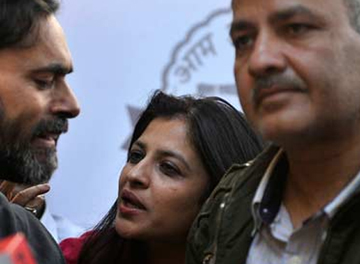New Delhi, Jun 7: Aam Aadmi Party leader Arvind Kejriwal has spoken his silence on the reports of rifts with second-in-command Yogendra Yadav.
 On Saturday, the former Delhi Chief Minister tweeted, "Yog yadav is a v dear friend and a v valued colleague. Had long discussion with him."
On Saturday, the former Delhi Chief Minister tweeted, "Yog yadav is a v dear friend and a v valued colleague. Had long discussion with him."
"Yog yadav has raised some imp issues. All of us will work on it," he added.
Clearing air about the former party leader Shazia Ilmi who recently quit the party alleging a lack of democracy within the party, Kejriwal tweeted, "We will also try to get shazia back."
The party held its national executive meeting on Friday against the backdrop of leaked email exchanges between senior leaders Manish Sisodia and Yogendra Yadav, which showed the acrimony between the two.
Sisodia, in his email, accused Yadav of targeting AAP chief Arvind Kejriwal and indirectly blamed Yadav for the party's Lok Sabha poll debacle in Haryana. He also accused Yadav of humiliating the party by making internal matters public.
"An ugly fight between you and Naveen Jaihind has been unfolding for the last 15 days. It is saddening that you have made your spat public and involved the media. The party is being humiliated. Even sadder is the fact that you want disciplinary action against Jaihind. You didn't get your way so now you have dragged Kejriwal into your personal fight. When you wanted to be projected as the Haryana CM candidate despite opposition from other PAC members, Arvind backed you," the email read. Yadav was AAP's Haryana in-charge while Jaihind was the state convener.
While both Yadav and Sisodia declined to comment on the email exchange, senior AAP leader Prashant Bhushan accepted that the party was facing certain problems. "In any new party, there are bound to be organisational and other problems. The NE met today to discuss all these issues," he said.
Senior leader Sanjay Singh asserted that the party was united. "In a democratic party, there are problems because of differences in opinion. But the party is united," said Singh after the NE meeting. Party leaders said that the issues raised in the email exchange between Sisodia and Yadav were discussed in the meeting.





Comments
Add new comment